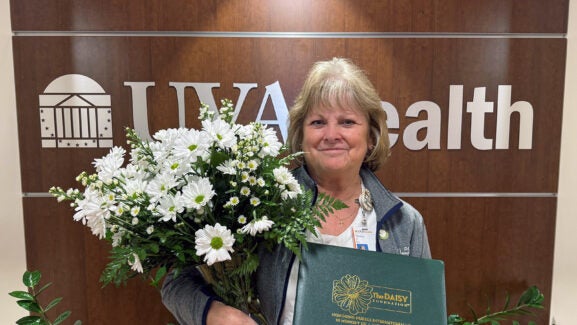
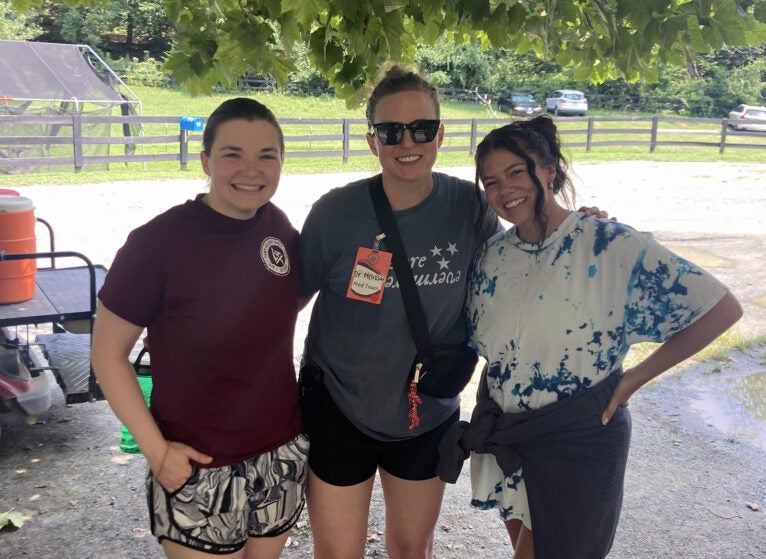
(l-r) Elyse Toole, RNCC, CDCES; Melissa Schoelwer, MD; and Abby Anderson, NP
Summer Camp Gives Kids and Volunteers a Fresh Look at Living With Diabetes
This summer, pediatric endocrinologist Melissa Schoelwer, MD, completed her third year volunteering as the Medical Lead of Diabetes Week at Camp Holiday Trails. She traded her name badge and white coat for shorts and a T-shirt. She slept in a cabin, sang songs around a campfire and connected with kids by sharing S’mores instead of talking about diabetes.
“We had 37 kids with type 1 at camp for Diabetes Week and, of those, around 28 were UVA patients, which was really special,” she says. “It was just wonderful to see our patients outside of our clinic. To have that common experience, for kids to see me having fun and being goofy … it’s a great way to build trust. That’s why I do it.”
Schoelwer was joined by ten Pediatric Endocrinology Clinic staff over the course of the week, who were encouraged to take shifts volunteering. “The Diabetes Clinic closed for the week, so more of our team could go to camp,” says Diabetes Educator and RN Care Coordinator Elyse Toole. “I got to go every day and stay through breakfast, lunch and dinner, which was a really awesome opportunity.”
“I was able to go to camp for the first time, and I found it amazing,” says Elizabeth “Buffy” Cech, RN Care Coordinator." To have the support of our Division Chief [David Repaske, MD, PhD], in my mind, is a huge testament to the value of camp for patients and families in and outside of our clinic.”
Building on Tradition
Camp Holiday Trails will celebrate its 50th anniversary this November. The nonprofit, which was started by UVA physicians, is a year-round camp for kids and teens ages 7 to 17 with chronic medical conditions and their siblings. It gives them an opportunity to focus less on a diagnosis and more on what matters most: being a kid.
“For most of the summer at Camp Holiday Trails, kids with a variety of chronic health conditions — cancer, epilepsy, hemophilia and others — are all mixed together. But I really wanted to do a dedicated diabetes week, so we started that three years ago,” says Schoelwer.
Throughout the week, kids participate in their choice of traditional camp activities, from horseback riding and archery to arts and crafts, canoeing and more. At every activity, a medical staff member is there to help.
“The majority of children with type 1 are now using diabetes technology, such as automated insulin pumps and continuous glucose monitors that read their blood sugar in real time,” explains Schoelwer. “At an activity, a medical team member gathers up the devices to monitor the campers’ blood sugar trends. If a child is having low blood sugar, they can pull that child out of the activity [to treat the low] and get them safely right back to having fun.”
Lessons All Around
While the kids get to experience what it’s like focus on things other than their diabetes, volunteers get a real-life look at how this disease impacts their patients day to day. They see kids making tough food choices in the cafeteria, counting carbs, calculating insulin doses, talking to peers about their worries and fears, and managing the unexpected like an insulin pump that won’t stay put when you’re running and playing. These are insights volunteers take with them that broaden their understanding and shape future interactions with patients in clinic.
“We see patients for just a short period of time, either in the hospital or outpatient clinic,” says Toole, who also has type 1 diabetes. “For team members, seeing what these kids’ lives are actually like day to day is probably the best learning they will ever get for diabetes as a chronic illness. It's not just a physical disease. It's emotional, mental, social, financial, and more. This impacts so many areas of people's lives, and you can't ever turn it off. With high and low blood sugars, you're literally on a roller coaster that you can’t get off. That is a really tough thing for people, both with and without diabetes, to understand. [Camp] is a great learning opportunity to actually see the things we teach families in action and to get to apply them.”
Why Camp Matters
This year, thanks to donations from community supporters and those within UVA, including the Center for Diabetes Technology, more kids who might not have had an opportunity to experience camp were able to go for free. “We had one child who came for the very first time who has a really challenging home life and difficult social circumstances,” Toole says. “At first, she was very resistant to participating and was a little bit withdrawn. To see her throughout the week, starting to relax and let her guard down and start to bond with the other kids, to be leading songs at the flagpole by the end of the week, and really having some normalcy was really exciting because that is not a side of that child that I've ever seen before.”
There are many measures of a successful week at camp. This year, kids took home a bag full of muddy clothes after an impromptu rainy-day slip-and-slide. They also gained more confidence trying new things, and learning new diabetes self-management skills. They have a new perspective, not to mention new friends, after interacting with other kids who share similar challenges. And they have a better understanding of who they are and what they can accomplish.
“During pickup, we asked every child the question: ’Would you want to come back?’ Every person said, ‘Yes, absolutely! I want to come back to camp next year’,” says Toole.
Latest News

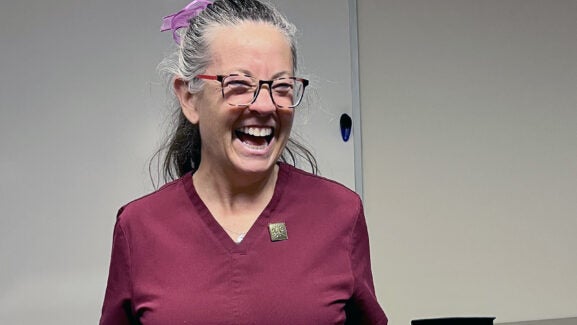
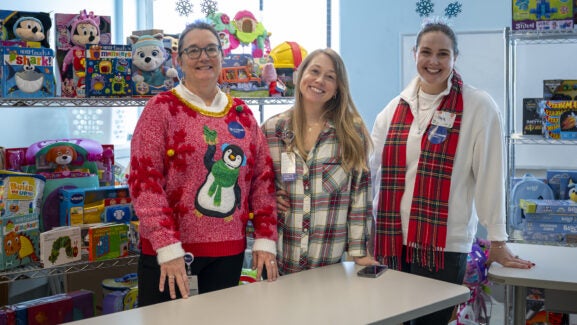
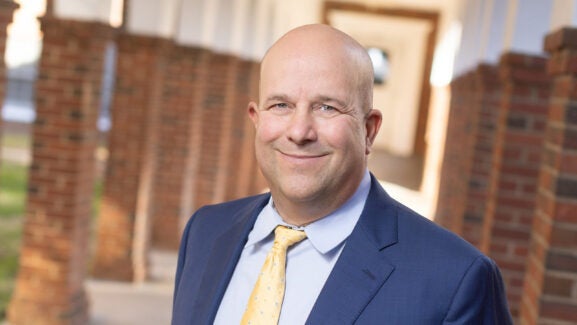
I am incredibly proud of this amazing team for their dedication and compassion and caring while volunteering at diabetes camp, making a lasting impact on the lives of so many! Your commitment to their health and well-being is inspiring!